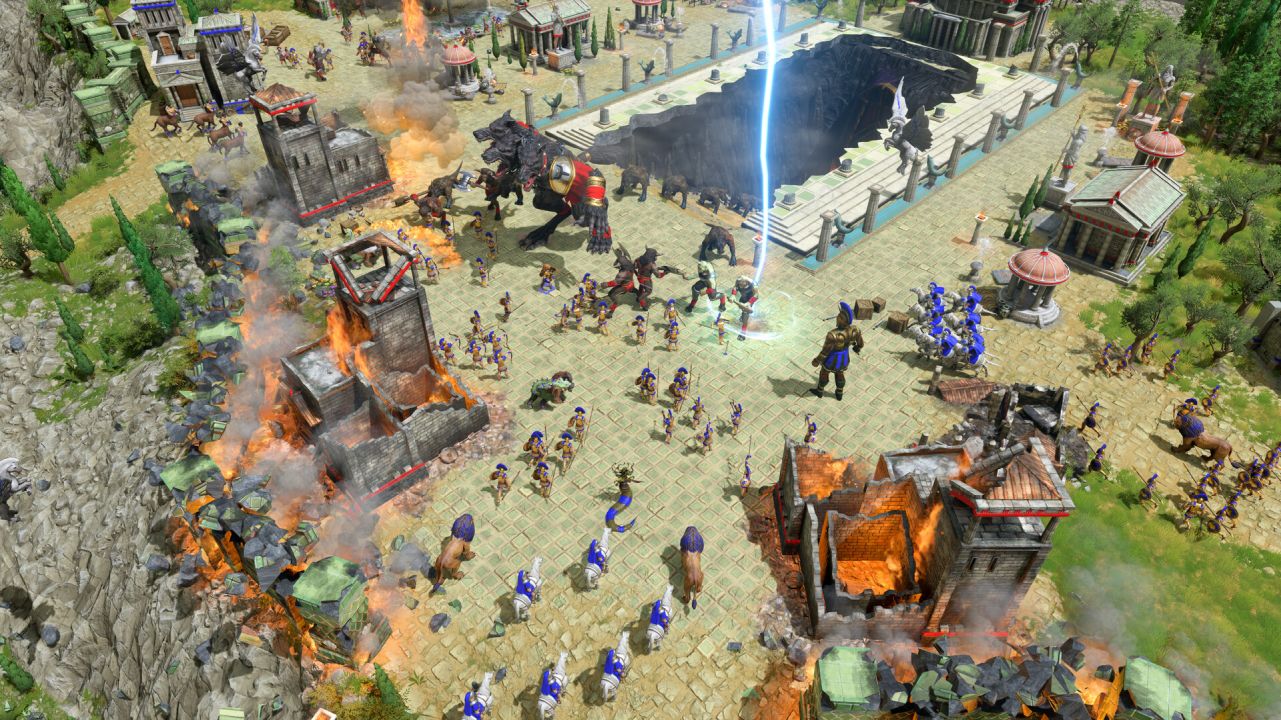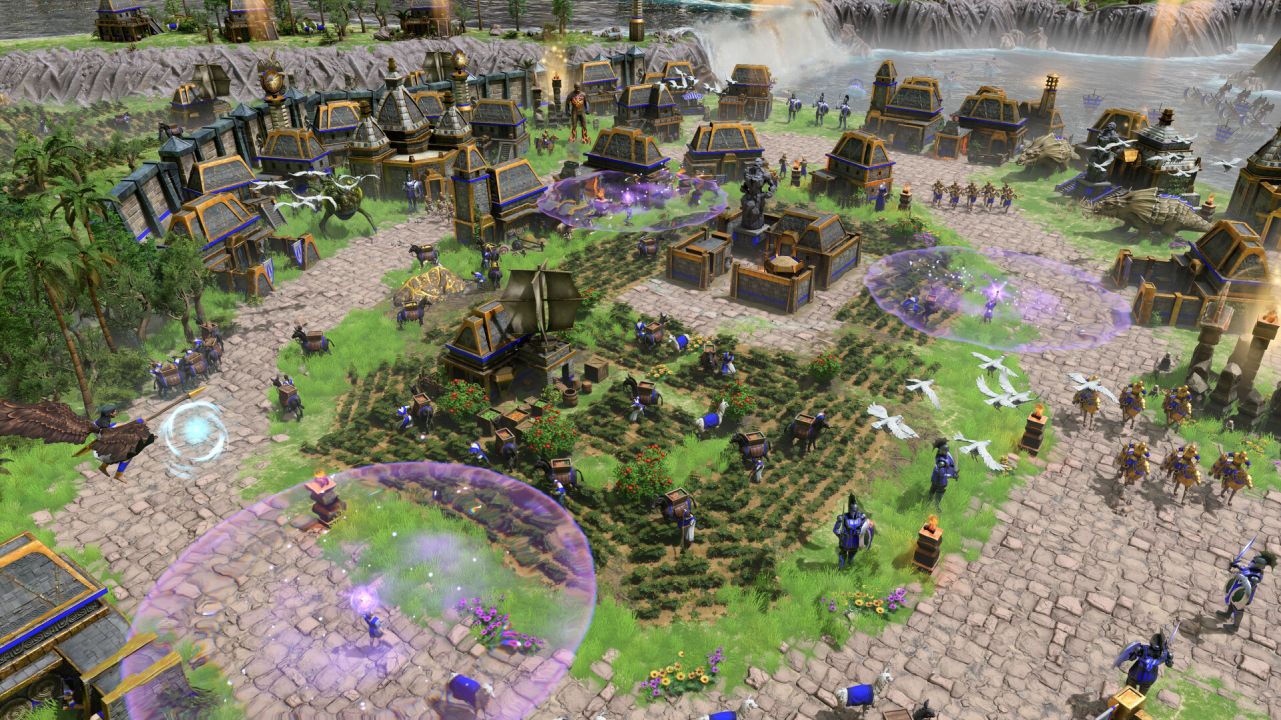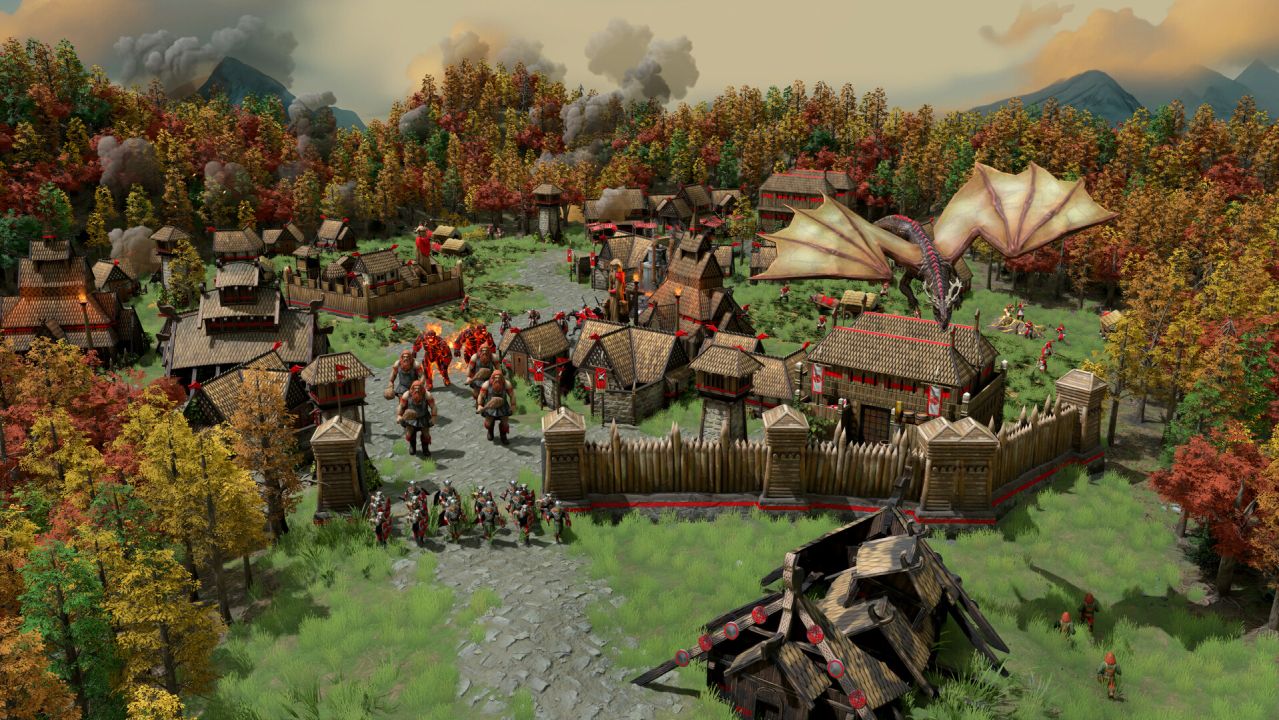Age of Mythology: Retold Review
Real Time Strategy games used to be a Big Deal. Nowadays, the genre has long since retreated from the frontlines to turtle timidly in its home base, churning out remakes or sequels that cleave closely to what came before (Company of Heroes 3, Homeworld 3, Sins of a Solar Empire 2, to name but a few). The last few years have been less of a renaissance for the genre than a drawn-out revisiting of past glories, like a wake where everyone has decided to celebrate with balloons and party poppers rather than dwell on what they’ve lost.

The Age of Empires franchise has been at the centre of this nostalgia-fuelled remaster bonanza, with Microsoft on a mission to resurrect each entry in a newer, shinier package that plays nicely with modern hardware. The latest to receive this treatment is Age of Mythology, a spinoff from the main historical series which nonetheless shares the same gameplay bones. This is actually the third iteration of Age of Mythology, following 2014’s Extended Edition. Put like that, Retold may sound like an unnecessary cash grab, but after spending many happy hours with the game, clicking on villagers and attack-moving with armies of heroes, hoplites, and minotaurs, any cynicism I might have had soon evaporated. Age of Mythology: Retold is quite frankly a damn good time. It’s not perfect-the Age of Empires foundation on which it is built feels a bit creaky nowadays-but it does offer a compelling package that improves on an already excellent game.
If you’ve played any ‘Age of…’ game, you’ll be instantly familiar with the basics of tasking villagers to gather resources-food, wood, gold, and favour-and building up your base while working through four ages to fully open up the tech tree. The mythology comes in through myth units and god powers, which are tied to the gods you choose to patronise. There are major gods (three per faction), which you choose at the start of the game (or which are chosen for you, in the case of campaign missions), and minor gods, which you’ll pick every time you research the next age. Each minor god brings a cluster of unique upgrades, myth units, and a new god power that you can cast directly onto the battlefield. It’s always tempting to opt for the flashiest powers that allow you to smite your opponents with a lightning storm or a plague of locusts (shudder), but there are also plenty of useful powers that allow you to boost your economy.
All the gods are associated with one of the game’s four factions (the Greeks, Egyptians, Norse, and Atlanteans) so you can’t mix and match gods from different pantheons, but there’s still a lot of flexibility. I really like this system in comparison to the more usual Age of Empires set up, where you typically choose a faction from a long list of mostly samey civilisations. Age of Mythology instead offers up four factions that are each quite distinct. The Norse, for example, use their basic infantry (rather than villagers) to create buildings and mobile ox carts to drop off resources. The Atlanteans don’t need resources to be dropped off at all, and can turn ordinary soldiers into powerful heroes, while the Egyptians use their pharaoh to power up buildings to make them more efficient.

I wouldn’t go so far as to say that these factions are dramatically asynchronous, but each of them brings enough new mechanics to make them feel genuinely different. With the system of choosing major and minor gods layered on top, there’s plenty of variety; two players using the same faction can end up with very different armies and upgrades, depending on their choice of gods. It’s a setup that strikes a nice balance between keeping the factions distinct, while also giving you plenty of ways to customise your approach. The fact that you choose minor gods during a match means you can adapt on the fly to whatever your opponents might be throwing at you.
The god powers and myth units are a big part of why Age of Mythology is as fun as it is, and why I’d recommend it to most newcomers over the more straight-laced historical games. Retold seems to understand its own strengths, too. One of its most enjoyable changes is that god powers are no-longer a one-shot deal, albeit the favour costs increase each time you use a particular power. The myth units also benefit hugely from Retold’s graphical overhaul. You can now zoom in a lot closer to the action than before, allowing you to count the individually animated snakes on a medusa’s head, or admire a minotaur’s sparkling nose ring as he sends a group of enemy soldier’s flying across the screen with his double-sided axe. If that doesn’t sound fun to you, I’m not sure we can be friends.
The visual upgrade is easily the most noticeable difference compared to the 2002 original or the Extended Edition, although there are a few gameplay tweaks under the hood that returning players will notice. The ability to attack move is particularly welcome, as is the ability to have scouts auto-explore (although the latter option should be used cautiously, unless you want to see your graceful pegasi constantly shot out of the sky). Also welcome are the extensive accessibility options, like a text narrator and colourblind settings, which mirror those in other modern releases from Microsoft.

There’s also a new villager priority system, similar to that seen in the AoE remasters. Rather than manually assigning villagers to different tasks, you can choose from a selection of predefined ratios to automatically task villagers to attend to particular resources. This is designed to help new players, as well as those playing on consoles or with gamepads, where micromanaging villagers can be more of a headache (Retold simultaneously launched on Xbox and PC, with the PC version coming with gamepad support from the start). This system is good but not foolproof. I made use of it now and then in campaign missions where I had to build up my economy while babysitting units on another part of the map, but inevitably some of my villagers ended up wandering off to gather resources in unhelpfully far flung locations, a long way from drop off sites. So if you do make use of this system, you’ll still need to intervene frequently to keep your economy ticking over.
While the changes in Retold are positive, they don’t fundamentally alter the basic flow of the game, and that is mostly a good thing. Age of Mythology was never broken and doesn’t need fixing. That said, as much as I love the familiar routine of gathering resources, building my base, and creating an army to smash the enemy, this style of gameplay can feel antique at times. There’s a typical rock-paper-scissors relationship between army units, but in practice this can get lost in campaign missions, even on higher difficulty levels. Turtling in your base until you can field a big army with some siege units mixed in is usually enough to quell the opposition. It was a similar situation in the multiplayer matches I played, although I’m sure high level players will be able to make more nuanced use of the units on offer. Pathfinding is also poor at times. Dense groups of units often get in each other’s way, frequently leading to situations where one unit will push another forward to get where it wants to go, sometimes for quite a long way, which can look quite silly.
Some returning players will no doubt be most excited to jump into skirmish and multiplayer matches, but it’s worth drawing attention to the extensive single player campaigns on offer. The first of these, Fall of the Trident, is the main campaign from the original 2002 release, telling the story of Atlantean admiral Arkantos as he tries to placate the sea god Poseidon. At first you’ll be playing as the Greeks, but later you’ll take control of the Egyptians and the Norse-the three factions from the original base game. Taken on its own, this is a meaty campaign, comprising 32 missions that will take around 15-20 hours to complete. The story is good fun, serving as an excuse to go on a whistlestop tour of ancient mythology, from the siege of Troy to the river Styx in Hades, to Midgard in the frozen north. The voice acting is a bit hit and miss. The actor playing Arkantos sounds oddly like Seth McFarlane’s American Dad (Stan Smith), while the rest of the cast are mostly attempting Greek/Egyptian/Norse accents, with varying success. But really, it would be unreasonable to expect an RTS campaign to set a high benchmark for storytelling, and this one is very much worth the time it takes to complete, with a nice variety of missions that don’t all involve building a base and sallying out to destroy an enemy stronghold. Combining the three original factions into one campaign with a (mostly) consistent cast of characters helps keep things engaging throughout.

There’s also a bonus Norse campaign called The Golden Gift, plus the Atlantis campaign that came with The Titans Expansion pack released in 2003. Although shorter than Fall of the Trident, these are both fairly substantial campaigns, so there is no shortage of single player content to sink your teeth into. The 2016 Tale of the Dragon campaign, part of the Chinese mythology expansion for the Extended Edition, is not included in Retold’s base game but is coming soon as DLC.
The thought I keep coming back to as I sink more hours into Age of Mythology: Retold is simply how fun it all is. The god powers and myth units are the special sauce that make matches both more chaotic and more entertaining. The standard edition retails for $29.99/£22.49, and for me the graphical overhaul alone justifies this price. The myth units, god powers, and the way damaged buildings now fall apart piece by piece, are all distractingly nice to look at. Add to that the many small but well considered gameplay tweaks – some of which, like the villager priority system, can be ignored if not needed or wanted – and you have a compelling package.
Will Zeus, Osiris, or Thor see fit to bless us with a truly new, innovative RTS that pushes the genre forward and leaves nostalgia in the past? Only time will tell, but for now Age of Mythology: Retold is here to help you revel in past glories. And what a glorious past it is.
